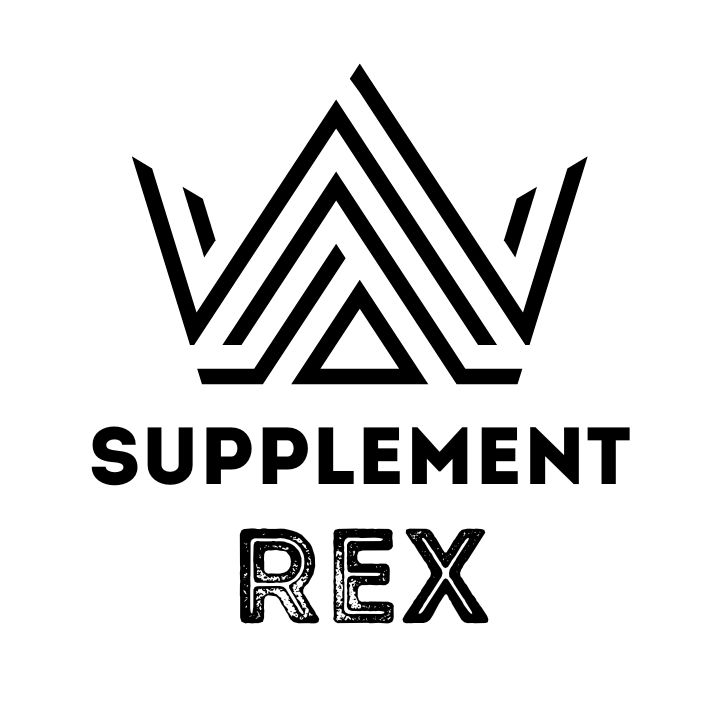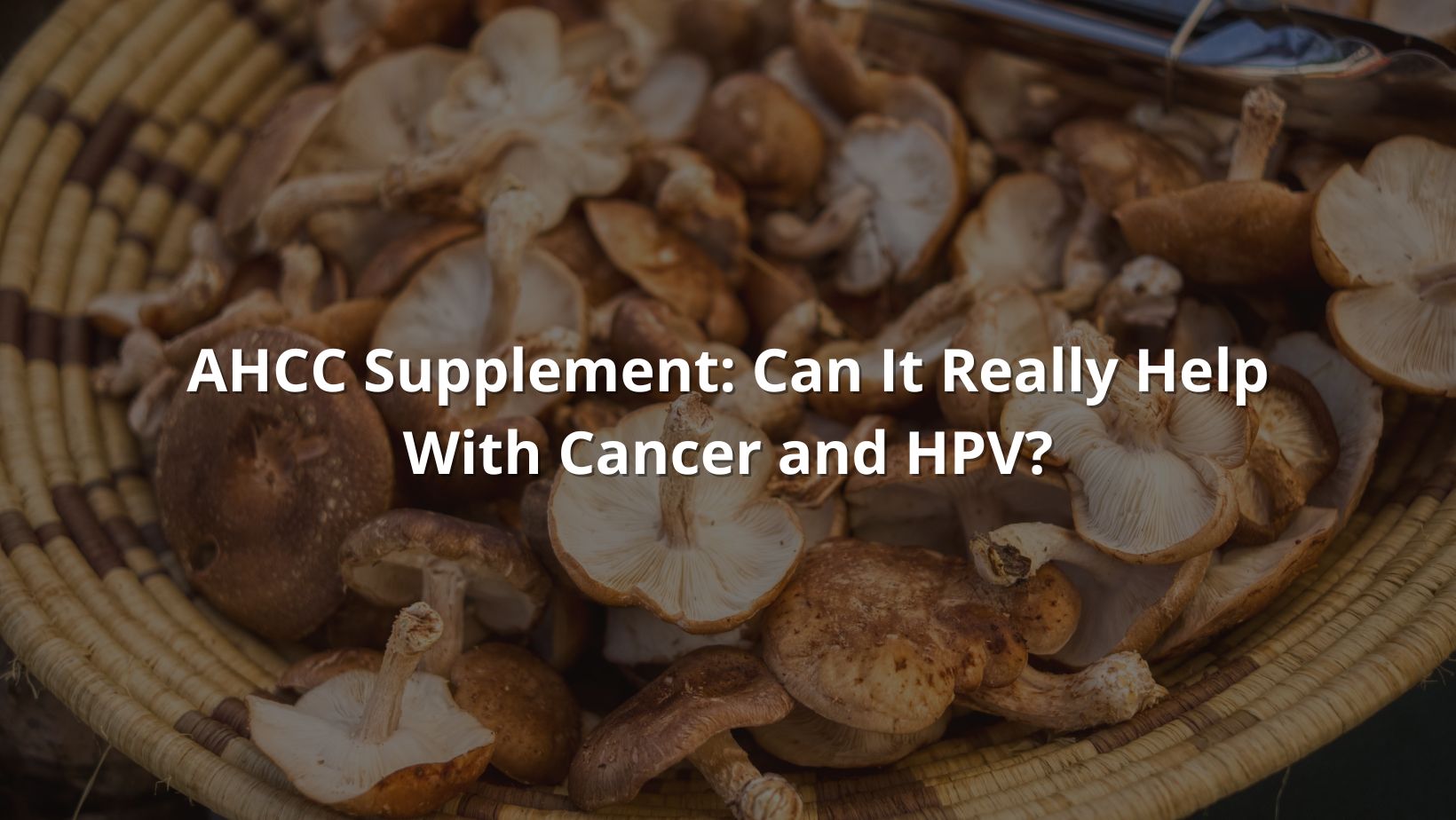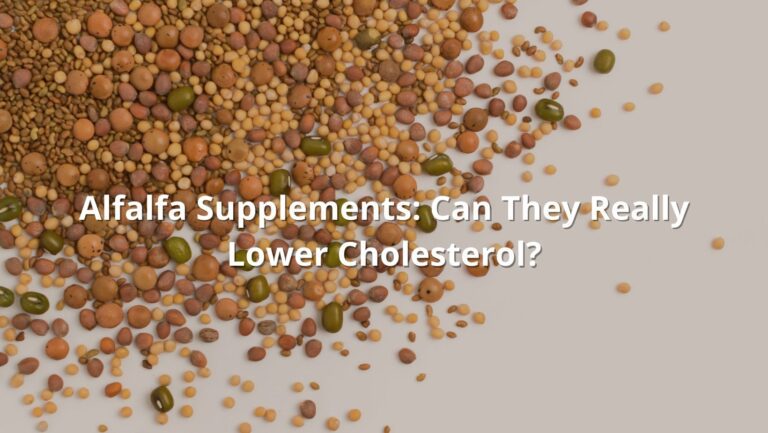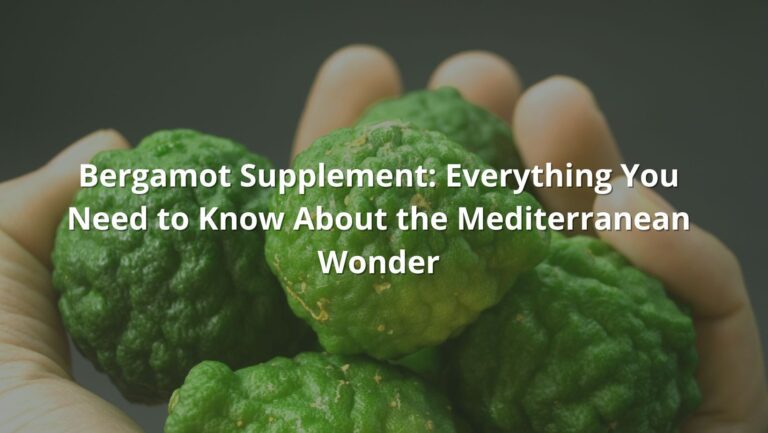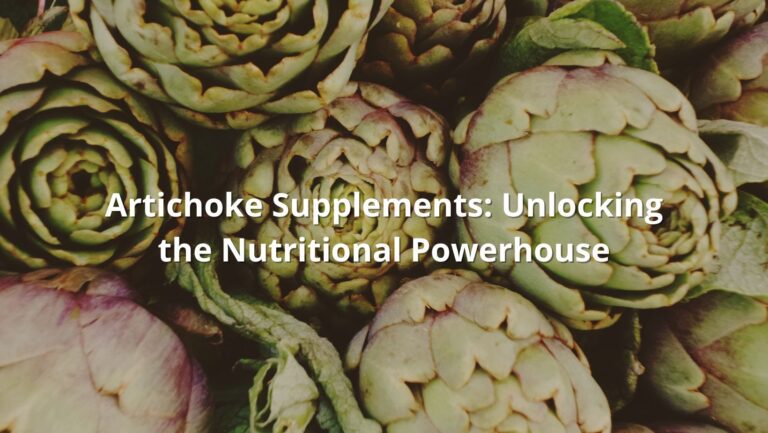AHCC Supplement: Can It Really Help With Cancer and HPV?
Many people today are looking for natural supplements to support their health, especially in the face of chronic diseases such as cancer and HPV. The AHCC supplement is one such supplement that has gained popularity in recent years due to its potential health benefits.
In this article, we will explore all the things you need to know about AHCC supplement, including its benefits, dosage, side effects, and precautions. But first, let’s talk about what the compound really is – and where it came from:
What is AHCC Supplement?
AHCC Supplement, also known as Active Hexose Correlated Compound, is a dietary supplement derived from shiitake mushrooms. It was first developed in Japan in 1989 as a natural way to support the immune system. AHCC comes from the mycelia (the root-like part) of the shiitake mushroom and it contains acetylated α-glucan, a unique compound for the supplement.
AHCC Supplement is often used as an immunomodulatory agent [1], meaning it helps to regulate the immune system by enhancing its activity or suppressing its overactivity. The supplement is also believed to have anti-inflammatory, antioxidant, and anti-cancer properties.
AHCC is widely available in Japan and China where many people take it for its general health benefits – but, it’s especially popular in cancer patients.
How Does AHCC Supplement Work?
The precise mechanism of how the AHCC supplement works is not fully understood. However, researchers believe that it works by enhancing the immune system’s natural killer cell activity, which plays a critical role in identifying and destroying cancer cells and infected cells. Active Hexose Correlated Compound likely also works on T-cells, another key player in the body’s defense mechanisms against disease.
So how come AHCC can activate these cells? The current best guess is it actually activates cytokine production [2], which are proteins that help to regulate the immune system’s response to infections and diseases.
Benefits of AHCC Supplement for HPV, Liver Health, and Cancer
With its immunomodulatory properties, AHCC supplement has been gaining popularity as a natural approach to enhance the immune system. Let’s look at some of the most compelling arguments in its favor – and some of the conditions it might benefit:
HPV
Human papillomavirus (HPV) is a common sexually transmitted infection that can cause genital warts and increase the risk of certain cancers, such as cervical cancer. [3] AHCC has been shown to have antiviral activity against HPV and may help to reduce the risk of developing HPV-related cancers. Studies have shown that AHCC supplementation can clear HPV infections [4]. This can, in turn, reduce the risk of cervical dysplasia (abnormal cell growth in the cervix) that can turn into cancer.
Liver Health
The liver is an essential organ that plays a vital role in detoxification and metabolism. AHCC is believed to help support liver function and protect the liver from damage by toxins. Studies have shown that AHCC may help to reduce liver damage caused by alcohol consumption [5]. AHCC is also an excellent supplement for general liver health support.
Cancer
AHCC is often used as an adjunctive therapy for cancer treatment due to its potential anti-neoplastic properties. In animal models the supplement has slowed down cancer growth [6], improved the efficiency of chemotherapy [7], and increased overall survival. [8]
And, AHCC seems to be especially useful for liver cancer where it can improve patient prognosis [9].
AHCC Supplement Dosage and Administration
The recommended dosage of AHCC can vary from person to person, especially if you have liver or kidney issues. It is essential to follow the manufacturer’s instructions and consult with a healthcare provider before taking the supplement.
The typical dosage for general immune support is 3 grams per day. This is what most studies test and find to be beneficial – and, low-risk for complications.
Food may change the eay you absorb AHCC, so it’s best to take the supplement on an empty stomach. You can either do it first thing in the morning or wait at least two hours after a meal. This ensures your stomach will be empty and you’ll absorb the optimal dose of AHCC.
Side Effects and Precautions of AHCC Supplement:
AHCC is generally considered safe and well-tolerated – it is, after all, a supplement given to a range of different patients, some of them very sick. However, like any supplement or medication, it can cause side effects.
Some common side effects of AHCC include mild gastrointestinal symptoms such as bloating, gas, and diarrhea. These side effects typically resolve on their own and do not require medical intervention. If you need extra help with them, consider switching to a gentler diet for a couple of days or using a GI-supporting supplement like spearmint extract.
AHCC may interact with some medications, such as aromatase inhibitors which are used for breast cancer and gynecomastia treatment. If you are taking any medications or have any medical conditions, definitely keep your doctor in the loop about your new supplement regimen. While adverse effects and interactions are few and far between, it’s important for your medical team to know about your health status – and this also includes the supplements you’re taking.
Finally, AHCC is not a replacement for standard cancer treatments, such as chemotherapy or radiation therapy. While it can support cancer treatment (making it an adjuvant therapy), talk to your oncologist before including it in your regimen.
Conclusion
AHCC is a natural supplement derived from shiitake mushrooms that has gained popularity due to its potential health benefits. It is believed to have anti-inflammatory, antioxidant, and anti-cancer properties and may help to support the immune system, liver function, and reduce the risk of HPV-related cancers.
However, it is crucial to speak with a healthcare provider before taking an AHCC supplement, especially if you are on any drugs or you have been diagnosed with a medical condition. While AHCC supplement is generally safe and helpful in cancer, it’s not a miracle solution, nor is it a replacement for chemotherapy, radiotherapy, surgery, or any other standard neoplasia treatment.
In conclusion, AHCC may be a useful addition to a healthy lifestyle and may provide potential wellness benefits, especially for those struggling with liver issues, HPV, or cancer. However, further research is needed to fully understand its effectiveness and safety in various medical conditions.
Frequently Asked Questions (FAQs):
Is AHCC Supplement safe?
AHCC is generally considered safe and well-tolerated. However, like any supplement or medication, it can cause side effects. It is essential to speak with a healthcare provider before taking AHCC, especially if you are taking any medications or have any medical conditions.
Can AHCC Supplement cure cancer?
AHCC is not a cure for cancer. However, it may help to improve immune function and enhance the effectiveness of cancer treatments such as chemotherapy and radiation therapy. Additionally, AHCC may help to reduce the side effects of cancer treatments such as nausea, vomiting, and fatigue.
What is the recommended dosage of AHCC Supplement?
The recommended dosage is usually 3 grams/day. But, do follow the manufacturer’s instructions and consult with a healthcare provider before taking AHCC.
Can AHCC Supplement help with liver health?
AHCC Supplement is believed to help support liver function and protect the liver from damage by toxins. Research has indicated that AHCC may help to reduce liver damage caused by alcohol consumption.
Is AHCC Supplement effective against HPV?
AHCC Supplement has been shown to have antiviral activity against HPV and may help to reduce the risk of developing HPV-related cancers. There is research where AHCC managed to clear HPV infections – which does, in turn, reduce the risk of cervical dysplasia.
References
- Anil D. Kulkarni; Philip Calder; Toshinori Ito (2016). Clinician’s Guide to AHCC.
- Mallet, Jean-François; Graham, Émilie; Ritz, Barry W.; Homma, Kohei; Matar, Chantal (2015-01-18). “Active Hexose Correlated Compound (AHCC) promotes an intestinal immune response in BALB/c mice and in primary intestinal epithelial cell culture involving toll-like receptors TLR-2 and TLR-4”. European Journal of Nutrition
- Ljubojevic S, Skerlev M (2014). “HPV-associated diseases”. Clinics in Dermatology. 32 (2): 227–34
- Smith JA, Gaikwad AA, Mathew L, Rech B, Faro JP, Lucci JA 3rd, Bai Y, Olsen RJ, Byrd TT. AHCC® Supplementation to Support Immune Function to Clear Persistent Human Papillomavirus Infections. Front Oncol. 2022 Jun 22;12:881902. doi: 10.3389/fonc.2022.881902. PMID: 35814366; PMCID: PMC9256908.
- Kim H, Kim JH, Im JA. Effect of Active Hexose Correlated Compound (AHCC) in alcohol-induced liver enzyme elevation. J Nutr Sci Vitaminol (Tokyo). 2014;60(5):348-56. doi: 10.3177/jnsv.60.348. PMID: 25744424.
- Gao Y, Zhang D, Sun B, Fujii H, Kosuna K, Yin Z. Active hexose correlated compound enhances tumor surveillance through regulating both innate and adaptive immune responses. Cancer Immunol Immunother. 2006;55:1258-66.
- Hirose A, Sato E, Fujii H, Sun B, Nishioka H, Aruoma OI. The influence of active hexose correlated compound (AHCC) on cisplatin-evoked chemotherapeutic and side effects in tumor-bearing mice. Toxicol Appl Pharmacol. 2007;222:152-8.
- Fatechand K, Santhanam R, Shen B, et al. Active hexose-correlated compound enhances extrinsic-pathway-mediated apoptosis of acute myeloid leukemic cells. PLoS ONE. 2017;12:e0181729.
- Cowawaintaweewat S, Manoromana S, Sriplung H, et al. Prognostic improvement of patients with advanced liver cancer after active hexose correlated compound (AHCC) treatment. Asian J Allergy Immunol. 2006;24:33-45.
